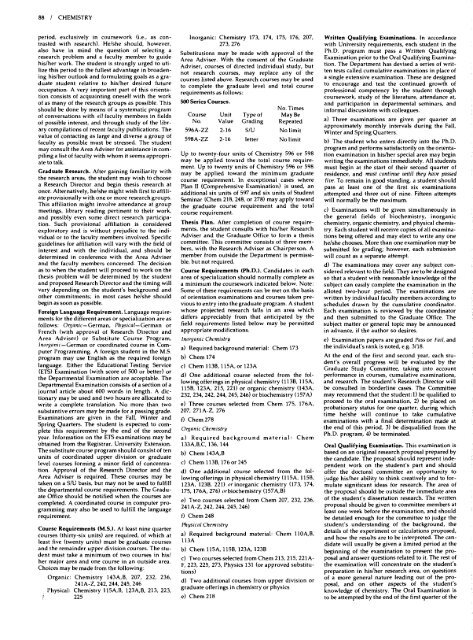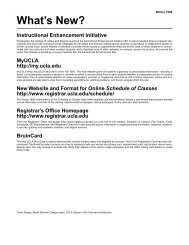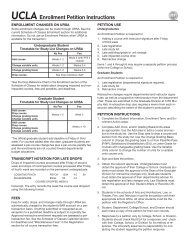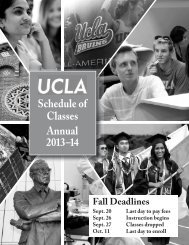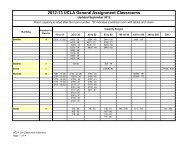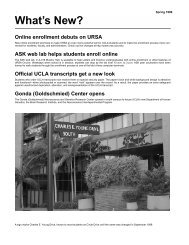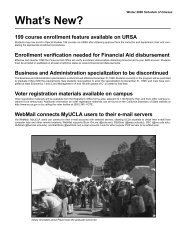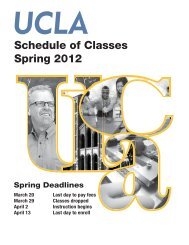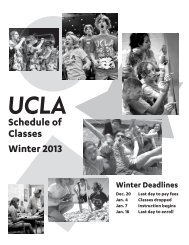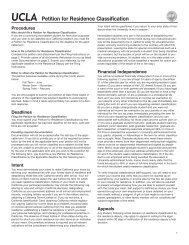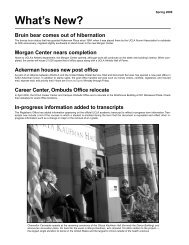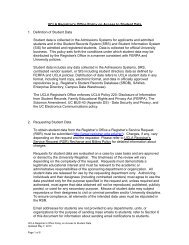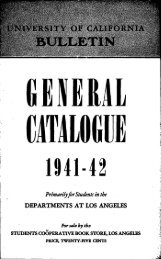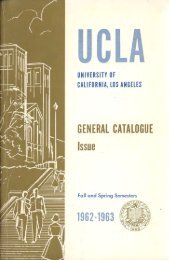UCLA Graduate Catalog 1980-81 - Registrar - UCLA
UCLA Graduate Catalog 1980-81 - Registrar - UCLA
UCLA Graduate Catalog 1980-81 - Registrar - UCLA
You also want an ePaper? Increase the reach of your titles
YUMPU automatically turns print PDFs into web optimized ePapers that Google loves.
88 / CHEMISTRY<br />
period, exclusively in coursework (i.e., as contrasted<br />
with research). He/she should, however,<br />
also have in mind the question of selecting a<br />
research problem and a faculty member to guide<br />
his/her work. The student is strongly urged to utilize<br />
this period to the fullest advantage in broadening<br />
his/her outlook and formulating goals as a graduate<br />
student relative to his/her desired future<br />
occupation. A very important part of this orientation<br />
consists of acquainting oneself with the work<br />
of as many of the research groups as possible. This<br />
should be done by means of a systematic program<br />
of conversations with all faculty members in fields<br />
of possible interest, and through study of the library<br />
compilations of recent faculty publications. The<br />
value of contacting as large and diverse a group of<br />
faculty as possible must be stressed. The student<br />
may consult the Area Adviser for assistance in compiling<br />
a list of faculty<br />
ate to talk.<br />
with whom it seems appropri-<br />
<strong>Graduate</strong> Research . After gaining familiarity with<br />
the research areas, the student may wish to choose<br />
a Research Director and begin thesis research at<br />
once. Alternatively, he/she might wish first to affiliate<br />
provisionally with one or more research groups.<br />
This affiliation might involve attendance at group<br />
meetings, library reading pertinent to their work,<br />
and possibly even some direct research participation.<br />
Such provisional affiliation is considered<br />
exploratory and is without prejudice to the individual<br />
or to the faculty members involved. Specific<br />
guidelines for affiliation will vary with the field of<br />
interest and with the individual, and should be<br />
determined in conference with the Area Adviser<br />
and the faculty members concerned. The decision<br />
as to when the student will proceed to work on the<br />
thesis problem will be determined by the student<br />
and proposed Research Director and the timing will<br />
vary depending on the student's background and<br />
other commitments; in most cases he/she should<br />
begin as soon as possible.<br />
Foreign Language Requirement . Language requirements<br />
for the different areas or specialization are as<br />
follows: Organic-German, Physical-German or<br />
French (with approval of Research Director and<br />
Area Adviser) or Substitute Course Program,<br />
Inorganic-German or coordinated course in Computer<br />
Programming. A foreign student in the M.S.<br />
program may use English as the required foreign<br />
language . Either the Educational Testing Service<br />
(ETS) Examination (with score of 500 or better) or<br />
the Departmental Examination are acceptable. The<br />
Departmental Examination consists of a section of a<br />
journal article about 600 words in length. A dictionary<br />
may be used and two hours are allocated to<br />
write a complete translation. No more than two<br />
substantive errors may be made for a passing grade.<br />
Examinations are given in the Fall, Winter and<br />
Spring Quarters. The student is expected to complete<br />
this requirement by the end of the second<br />
year. Information on the ETS examinations may be<br />
obtained from the <strong>Registrar</strong>, University Extension.<br />
The substitute course program should consist of ten<br />
units of coordinated upper division or graduate<br />
level courses forming a minor field of concentration.<br />
Approval of the Research Director and the<br />
Area Adviser is required. These courses may be<br />
taken on a S/U basis, but may not be used to fulfill<br />
the departmental course requirements. The <strong>Graduate</strong><br />
Office should be notified when the courses are<br />
completed. A coordinated course in computer programming<br />
may also be used to fulfill the language<br />
requirement.<br />
Course Requirements (M.S.). At least nine quarter<br />
courses (thirty-six units) are required, of which at<br />
least five (twenty units ) must be graduate courses<br />
and the remainder upper division courses. The student<br />
must take a minimum of two courses in his/<br />
her major area and one course in an outside<br />
Choices may be made from the following:<br />
area.<br />
Organic: Chemistry 143A,B, 207, 232, 236,<br />
241A-Z, 242, 244, 245, 246<br />
Physical: Chemistry 115A,B, 123A,B, 213, 223,<br />
225<br />
Inorganic: Chemistry<br />
273, 276<br />
173, 174, 175, 176, 207,<br />
Substitutions may be made with approval of the<br />
Area Adviser. With the consent of the <strong>Graduate</strong><br />
Adviser, courses of directed individual study, but<br />
not research courses, may replace any of the<br />
courses listed above. Research courses may be used<br />
to complete the graduate level and total course<br />
requirements as follows:<br />
500 Series Courses.<br />
Course Unit Type of<br />
No. Times<br />
May Be<br />
No. Value Grading Repeated<br />
596A-ZZ 2-16 S/U No limit<br />
598A-ZZ 2-16 letter No limit<br />
Up to twenty-four units of Chemistry 596 or 598<br />
may be applied toward the total course requirement.<br />
Up to twenty units of Chemistry 596 or 598<br />
may be applied toward the minimum graduate<br />
course requirement. In exceptional cases where<br />
Plan II (Comprehensive Examination ) is used, an<br />
additional six units of 597 and six units of Student<br />
Seminar (Chem 218, 248, or 278) may apply toward<br />
the graduate course requirement and the total<br />
course requirement.<br />
Thesis Plan . After completion of course requirements,<br />
the student consults with his/her Research<br />
Adviser and the <strong>Graduate</strong> Office to form a thesis<br />
committee. This committee consists of three members,<br />
with the Research Adviser as Chairperson. A<br />
member from outside the Department is permissible,<br />
but not required.<br />
Course Requirements (Ph.D.). Candidates in each<br />
area of specialization should normally complete as<br />
a minimum the coursework indicated below. Note:<br />
Some of these requirements can be met on the basis<br />
of orientation examinations and courses taken previous<br />
to entry into the graduate program. A student<br />
whose projected research falls in an area which<br />
differs appreciably from that anticipated by the<br />
field requirements listed below may be permitted<br />
appropriate modifications.<br />
Inorganic Chemistry<br />
a) Required background material: Chem 173<br />
b) Chem 174<br />
c) Chem 113B, 115A, or 123A<br />
d) One additional course selected from the following<br />
offerings in physical chemistry (113B, 115A,<br />
115B, 123A, 215, 221) or organic chemistry (143A,<br />
232, 234, 242, 244, 245, 246) or biochemistry (157A)<br />
e) Three courses<br />
207, 271 A-Z, 276<br />
f) Chem 278<br />
Organic Chemistry<br />
selected from Chem 175, 176A,<br />
a) Required background material: Chem<br />
133A,B,C, 136, 144<br />
b) Chem 143A,B<br />
c) Chem 1138, 176 or 245<br />
d) One additional course selected from the following<br />
offerings in physical chemistry (115A, 115B,<br />
123A, 123B, 221) or inorganic chemistry (173, 174,<br />
175, 176A, 276) orbiochemistry (157A,B)<br />
e) Two courses selected from Chem 207, 232, 236,<br />
241A-Z, 242, 244, 245, 246)<br />
f) Chem 248<br />
Physical Chemistry<br />
a) Required<br />
113A<br />
background material : Chem 110A,B,<br />
b) Chem 115A, 115B, 123A, 123B<br />
c) Two courses selected from Chem 213, 215, 221A-<br />
F, 223, 225, 273, Physics 131 (or approved substitutions)<br />
d) Two additional courses from upper division or<br />
graduate offerings in chemistry or physics<br />
e) Chem 218<br />
Written Qualifying Examinations . In accordance<br />
with University requirements, each student in the<br />
Ph.D. program must pass a Written Qualifying<br />
Examination prior to the Oral Qualifying Examination.<br />
The Department has devised a series of written<br />
tests called cumulative examinations in place of<br />
a single extensive examination . These are designed<br />
to encourage and test the continued growth of<br />
professional competency by the student through<br />
coursework, study of the literature, attendance at,<br />
and participation in departmental seminars, and<br />
informal discussions with colleagues.<br />
a) Three examinations are given per quarter at<br />
approximately monthly intervals during the Fall,<br />
Winter and Spring Quarters.<br />
b) The student who enters directly into the Ph.D.<br />
program and performs satisfactorily on the orientation<br />
examination in his/her special area may begin<br />
writing the examinations immediately. All students<br />
must begin at the start of their second quarter of<br />
residence, and must continue until they have passed<br />
five. To remain in good standing, a student should<br />
pass at least one of the first six examinations<br />
attempted and three out of nine. Fifteen attempts<br />
will normally be the maximum.<br />
c) Examinations will be given simultaneously in<br />
the general fields of biochemistry, inorganic<br />
chemistry, organic chemistry, and physical chemistry.<br />
Each student will receive copies of all examinations<br />
being offered and may elect to write any one<br />
he/she chooses. More than one examination may be<br />
submitted for grading; however, each submission<br />
will count as a separate attempt.<br />
d) The examinations may cover any subject considered<br />
relevant to the field. They are to be designed<br />
so that a student with reasonable knowledge of the<br />
subject can easily complete the examination in the<br />
alloted two-hour period. The examinations are<br />
written by individual faculty members according to<br />
schedules drawn by the cumulative coordinator.<br />
Each examination is reviewed by the coordinator<br />
and then submitted to the <strong>Graduate</strong> Office. The<br />
subject matter or general topic may be announced<br />
in advance, if the author so desires.<br />
e) Examination papers are graded Pass or Fail, and<br />
the individual's rank is noted, e.g. 3/18.<br />
At the end of the first and second year, each student's<br />
overall progress will be evaluated by the<br />
<strong>Graduate</strong> Study Committee, taking into account<br />
performance in courses, cumulative examinations,<br />
and research. The student's Research Director will<br />
be consulted in borderline cases. The Committee<br />
may recommend that the student:1) be qualified to<br />
proceed to the oral examination, 2) be placed on<br />
probationary status for one quarter, during which<br />
time he/she will continue to take cumulative<br />
examinations with a final determination made at<br />
the end of this period, 3) be disqualified<br />
Ph.D. program, 4) be terminated.<br />
from the<br />
Oral Qualifying Examination . This examination is<br />
based on an original research proposal prepared by<br />
the candidate. The proposal should represent independent<br />
work on the student' s part and should<br />
offer the doctoral committee an opportunity to<br />
judge his/her ability to think creatively and to formulate<br />
significant ideas for research. The area of<br />
the proposal should be outside the immediate area<br />
of the student's dissertation research. The written<br />
proposal should be given to committee members at<br />
least one week before the examination , and should<br />
be detailed enough for the committee to judge the<br />
student' s understanding of the background, the<br />
details of the experiment or calculations proposed,<br />
and how the results are to be interpreted. The candidate<br />
will usually be given a limited period at the<br />
beginning of the examination to present the proposal<br />
and answer questions related to it. The rest of<br />
the examination will concentrate on the student's<br />
preparation in his/her research area, on questions<br />
of a more general nature leading out of the proposal,<br />
and on other aspects of the student's<br />
knowledge of chemistry. The Oral Examination is<br />
to be attempted by the end of the first quarter of the


